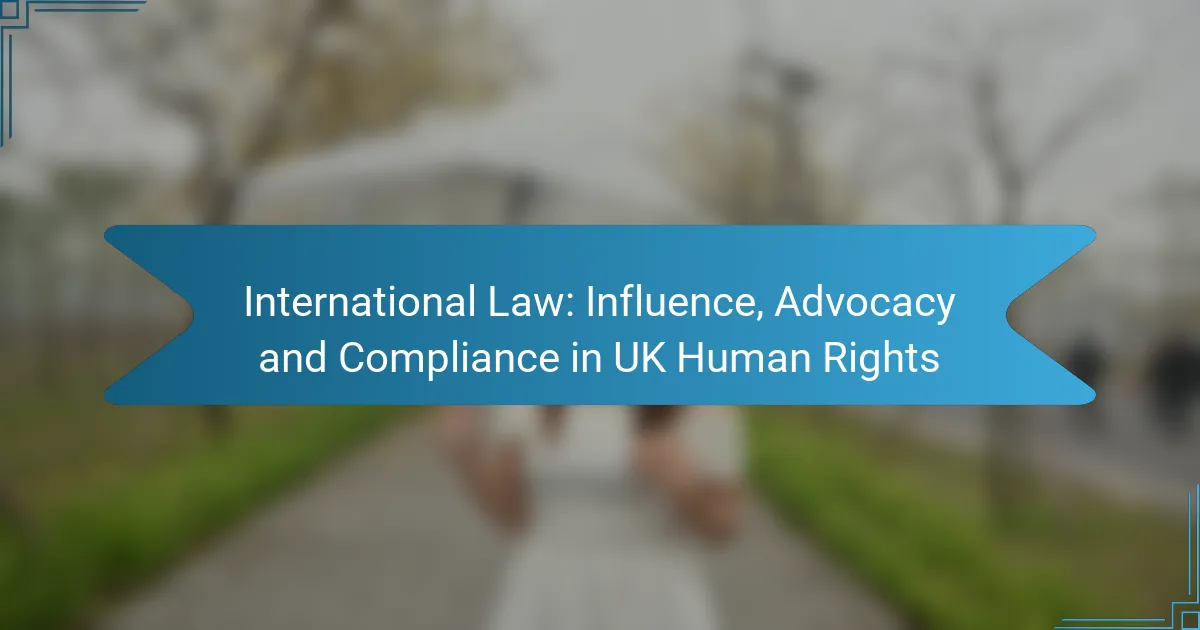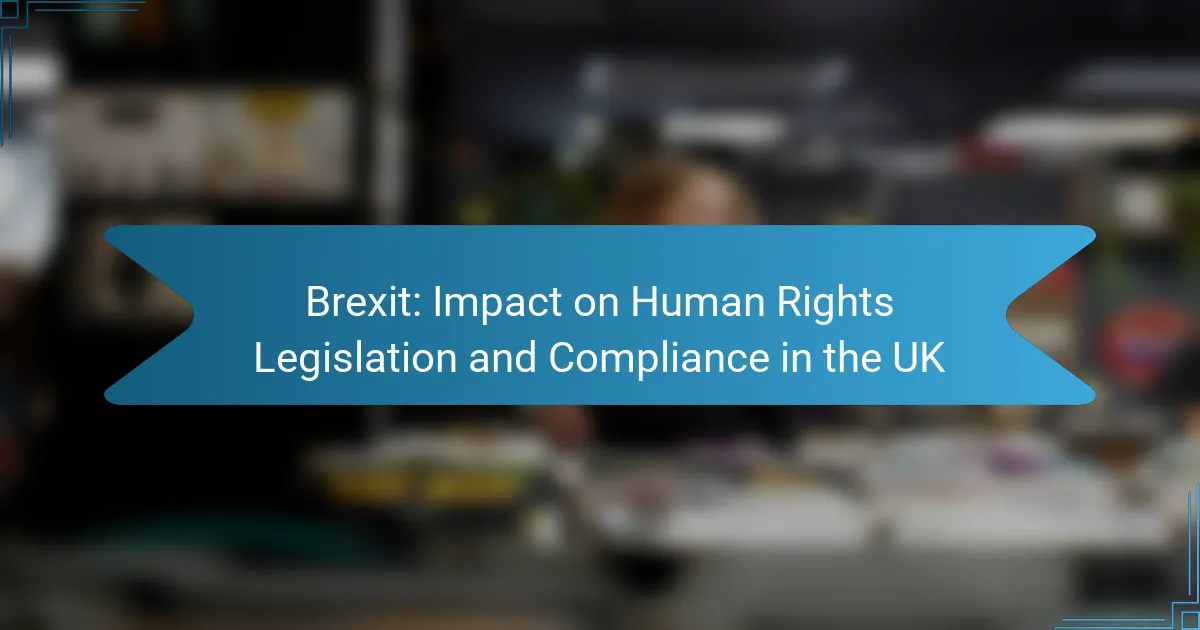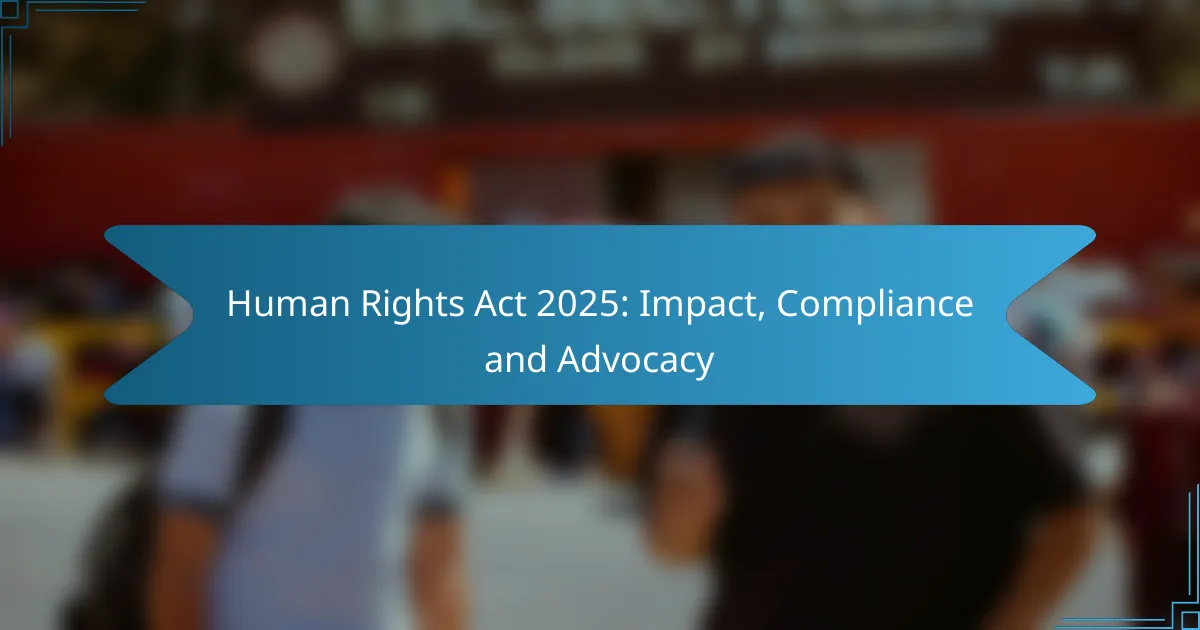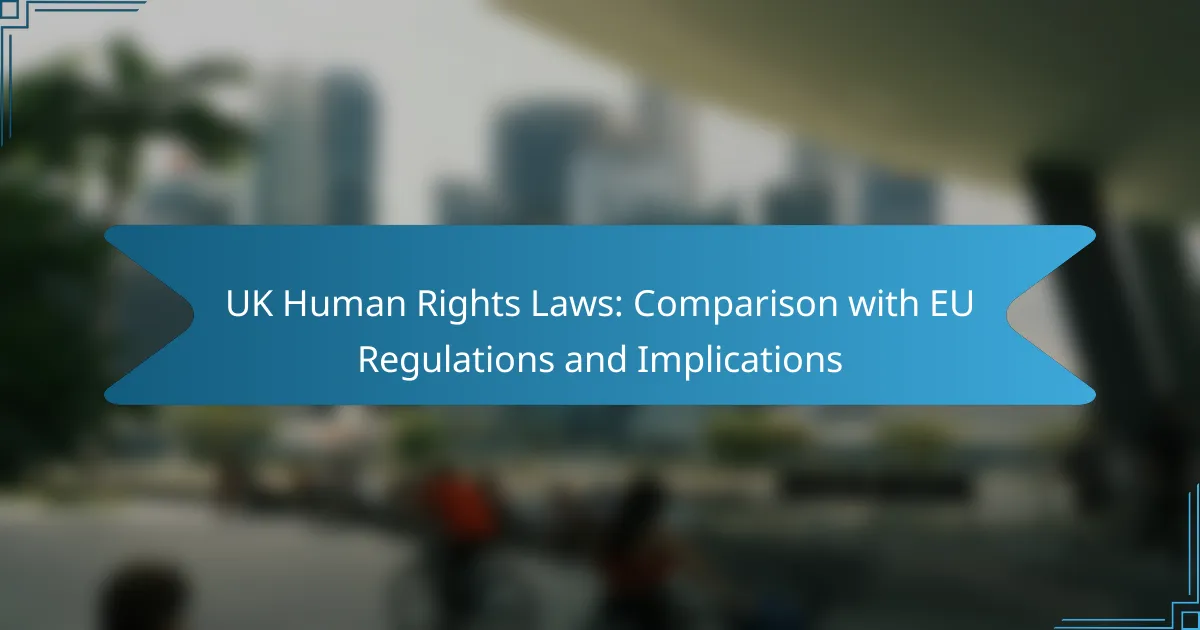International law plays a crucial role in shaping human rights in the UK by setting forth standards and obligations that the country must adhere to. Through treaties, case law, and commitments to international frameworks, the UK is influenced to uphold these rights. Advocacy efforts, including grassroots movements and NGO involvement, work to raise awareness and ensure compliance with these standards, while legislative and judicial measures provide the necessary oversight and accountability. Together, these elements contribute to the protection and promotion of human rights within the UK legal system.
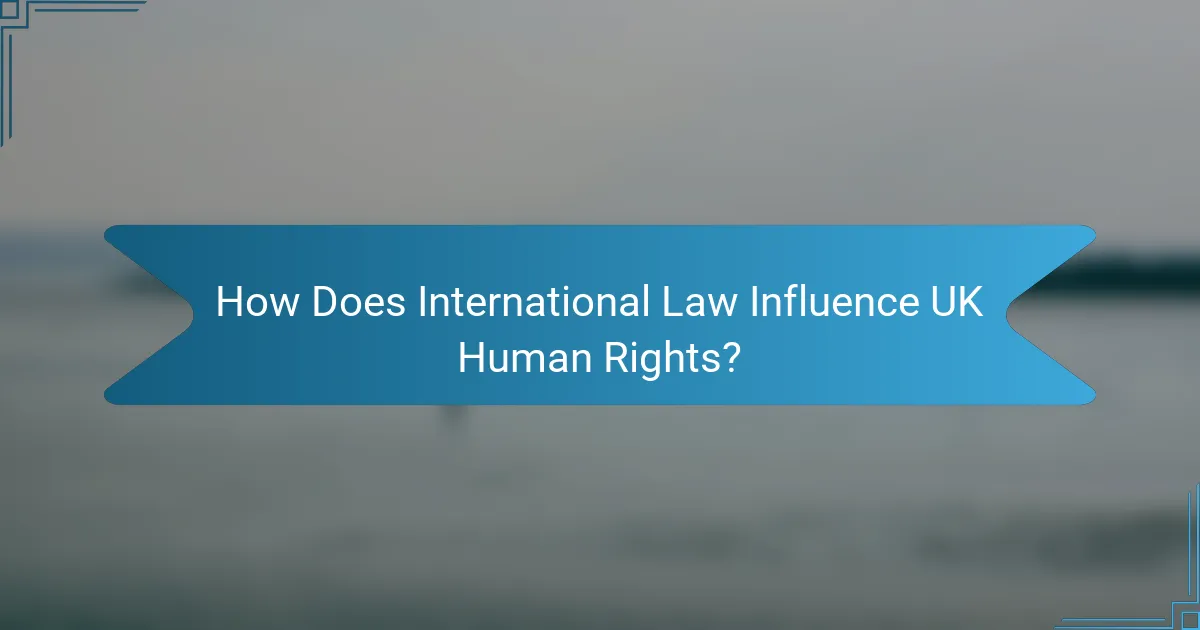
How Does International Law Influence UK Human Rights?
International law significantly shapes UK human rights by establishing standards and obligations that the UK is expected to uphold. This influence manifests through treaties, case law, and the UK’s commitment to various international human rights frameworks.
Framework of international treaties
The UK is a signatory to several key international treaties that form the backbone of its human rights obligations. These include the European Convention on Human Rights (ECHR) and the International Covenant on Civil and Political Rights (ICCPR). Such treaties require the UK to protect and promote fundamental rights within its jurisdiction.
These treaties create a legal framework that obligates the UK to align its domestic laws with international human rights standards. This alignment often leads to the incorporation of treaty provisions into UK legislation, ensuring that international commitments are reflected in national law.
Impact on domestic legislation
International law influences UK domestic legislation by prompting reforms that enhance human rights protections. For example, the Human Rights Act 1998 incorporates the ECHR into UK law, allowing individuals to seek redress for violations in domestic courts.
Legislative changes often arise from the need to comply with international obligations, leading to the enactment of laws that address issues such as discrimination, privacy, and freedom of expression. This dynamic ensures that UK law evolves in response to international human rights standards.
Case law examples
Case law plays a crucial role in interpreting and applying international human rights standards within the UK. Landmark cases, such as *R (on the application of Daly) v Secretary of State for the Home Department*, demonstrate how courts have utilized international law to inform their decisions and protect individual rights.
Judicial decisions often reference international treaties and conventions, reinforcing their relevance in domestic legal contexts. This practice not only upholds human rights but also encourages consistency in the application of law across different jurisdictions.
Role of the European Court of Human Rights
The European Court of Human Rights (ECtHR) is pivotal in shaping human rights law in the UK. As the judicial body interpreting the ECHR, it provides authoritative rulings that the UK must consider in its legal framework. The court’s decisions can lead to significant changes in UK law and policy.
UK courts are required to take ECtHR judgments into account, which can result in the modification of laws or practices that are found to be incompatible with the ECHR. This relationship ensures that UK human rights protections are continuously aligned with European standards.
Influence of UN conventions
UN conventions, such as the Convention on the Rights of the Child (CRC) and the Convention on the Elimination of All Forms of Discrimination Against Women (CEDAW), significantly influence UK human rights policies. These conventions set out specific rights and obligations that the UK is expected to uphold.
Compliance with these conventions often leads to the development of national policies and programs aimed at promoting and protecting the rights enshrined in these international agreements. The UK’s commitment to these conventions reflects its dedication to enhancing human rights at both domestic and international levels.
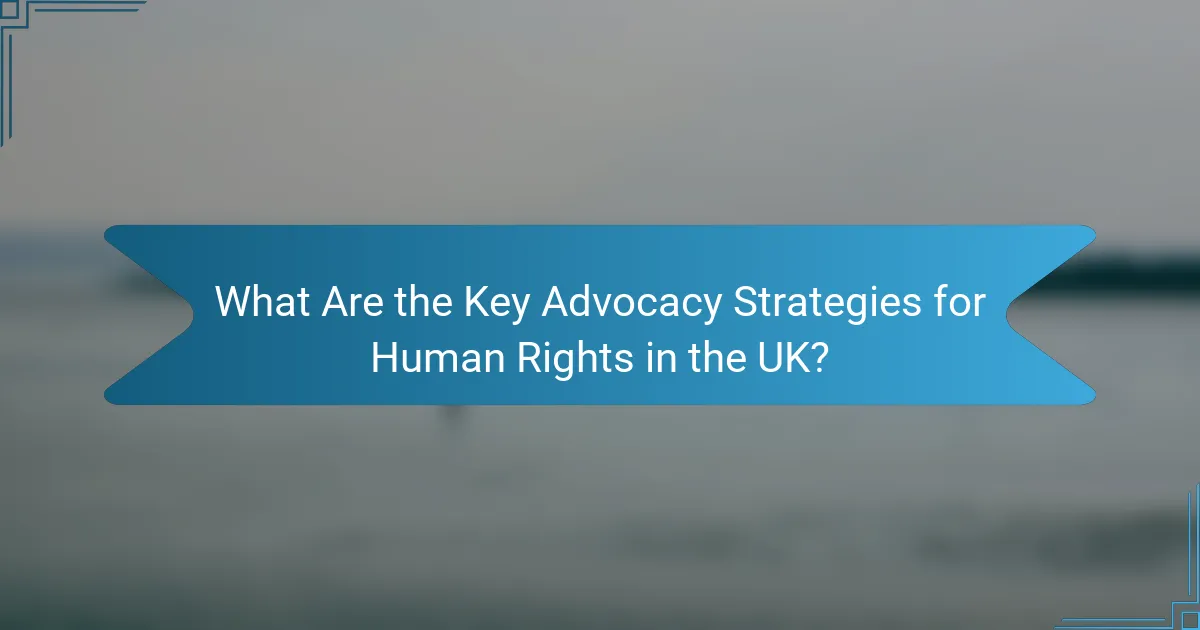
What Are the Key Advocacy Strategies for Human Rights in the UK?
Key advocacy strategies for human rights in the UK include grassroots movements, NGO involvement, public awareness campaigns, and legal advocacy. These strategies work together to promote awareness, influence policy, and ensure compliance with human rights standards.
Grassroots movements
Grassroots movements are essential for mobilizing community support and raising awareness about human rights issues. They often focus on local concerns and empower individuals to advocate for change within their communities. Examples include campaigns against discrimination and initiatives supporting marginalized groups.
These movements typically rely on volunteers and local resources, making them cost-effective. However, they may face challenges in gaining visibility and funding compared to larger organizations.
NGO involvement
Non-governmental organizations (NGOs) play a crucial role in human rights advocacy in the UK by providing expertise, resources, and a platform for marginalized voices. They often engage in policy analysis, lobbying, and coalition-building to influence legislation and public opinion.
Collaboration between NGOs can amplify their impact, but it is important to maintain clear communication and shared goals to avoid fragmentation of efforts. Examples of prominent NGOs include Amnesty International and Human Rights Watch.
Public awareness campaigns
Public awareness campaigns aim to educate the general public about human rights issues and mobilize support for advocacy efforts. These campaigns can take various forms, including social media initiatives, public events, and educational programs in schools.
Effective campaigns often use compelling narratives and visuals to engage audiences. It is crucial to target specific demographics and tailor messages accordingly to maximize reach and impact.
Legal advocacy
Legal advocacy involves using the law to protect and promote human rights, often through litigation and strategic legal actions. Organizations may challenge unjust laws or practices in court, aiming to set precedents that benefit broader human rights protections.
Legal advocacy can be resource-intensive and requires specialized knowledge. However, successful cases can lead to significant changes in policy and public perception, making it a powerful tool for human rights advancement in the UK.

How Is Compliance with International Law Ensured in the UK?
Compliance with international law in the UK is primarily ensured through a combination of legislative measures, judicial oversight, monitoring bodies, and government accountability mechanisms. These frameworks work together to uphold human rights and ensure that the UK adheres to its international obligations.
Legislative measures
The UK Parliament plays a crucial role in ensuring compliance with international law through the enactment of legislation that aligns with international treaties and agreements. Key laws, such as the Human Rights Act 1998, incorporate the European Convention on Human Rights into domestic law, allowing individuals to seek redress in UK courts.
Additionally, the UK government regularly reviews and amends existing laws to reflect changes in international standards. This proactive approach helps maintain alignment with evolving human rights norms and obligations.
Judicial oversight
Judicial oversight is essential for enforcing compliance with international law in the UK. Courts have the authority to interpret legislation in a manner that upholds international obligations, ensuring that domestic laws do not conflict with the UK’s commitments.
Judges can also review government actions and decisions, providing a check on executive power. This oversight helps protect individual rights and ensures that the government remains accountable for its compliance with international law.
Monitoring bodies
Various independent monitoring bodies exist to oversee the UK’s compliance with international law. The Equality and Human Rights Commission (EHRC) is one such body, tasked with promoting and protecting human rights in the UK.
These organizations conduct investigations, publish reports, and make recommendations to improve compliance. Their findings can influence public policy and drive legislative changes to better align with international standards.
Government accountability mechanisms
The UK government is held accountable for its compliance with international law through several mechanisms, including parliamentary scrutiny and public inquiries. Parliamentary committees regularly examine government actions and policies related to human rights, ensuring transparency and accountability.
Furthermore, civil society organizations play a vital role in advocating for compliance by raising awareness and pressing the government to fulfill its international obligations. This collaborative effort between the government and civil society enhances the overall framework for ensuring compliance with international law in the UK.
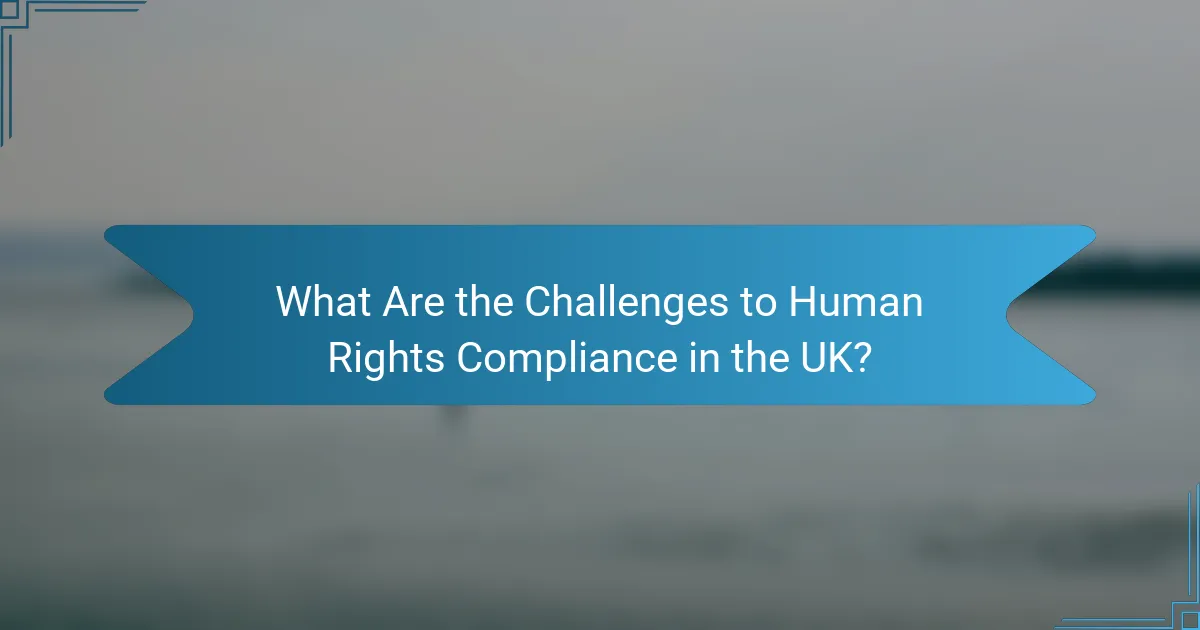
What Are the Challenges to Human Rights Compliance in the UK?
Challenges to human rights compliance in the UK include political resistance, resource limitations, and shifts in public opinion. These factors can significantly hinder the effective implementation and enforcement of human rights protections.
Political resistance
Political resistance often arises from differing ideologies and priorities among government officials and parties. Some lawmakers may prioritize national security or economic concerns over human rights, leading to policies that undermine protections.
For example, legislation aimed at counter-terrorism may inadvertently infringe on civil liberties, sparking debates about the balance between security and human rights. Advocacy groups frequently challenge such measures, but political support can be limited.
Resource limitations
Resource limitations significantly impact the enforcement of human rights laws in the UK. Insufficient funding for legal aid and human rights organizations can restrict access to justice for vulnerable populations.
Moreover, public sector cuts may lead to reduced staffing and resources in agencies responsible for monitoring and enforcing human rights standards. This can create gaps in oversight and accountability, making it difficult to address violations effectively.
Public opinion shifts
Public opinion shifts can influence government policies and priorities regarding human rights compliance. When the public becomes more concerned about issues like immigration or crime, there may be increased support for policies that restrict rights in these areas.
For instance, negative media portrayals of certain groups can lead to a decline in public support for human rights protections. Advocacy efforts must therefore focus on educating the public about the importance of upholding human rights for all, regardless of circumstances.
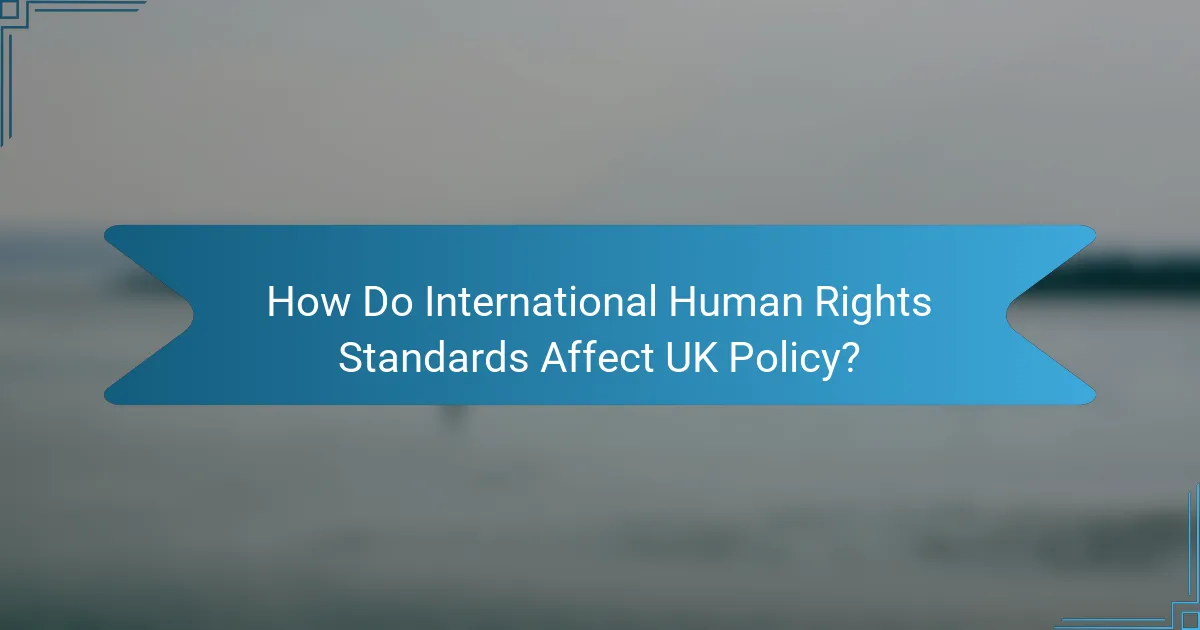
How Do International Human Rights Standards Affect UK Policy?
International human rights standards significantly influence UK policy by establishing benchmarks for human rights practices. These standards guide legislation, inform governmental actions, and shape public discourse on human rights issues.
Policy alignment with international norms
The UK strives to align its policies with international human rights norms, such as those outlined in the Universal Declaration of Human Rights and the European Convention on Human Rights. This alignment ensures that domestic laws reflect global human rights commitments, promoting accountability and protection for individuals.
For instance, the UK’s Human Rights Act 1998 incorporates the European Convention on Human Rights into domestic law, allowing individuals to challenge violations in UK courts. This integration exemplifies how international standards can directly influence national legislation and judicial processes.
To maintain effective policy alignment, the UK government regularly reviews its laws and practices against international benchmarks. Stakeholders, including NGOs and civil society, play a crucial role in advocating for compliance and highlighting areas needing improvement.
